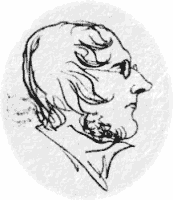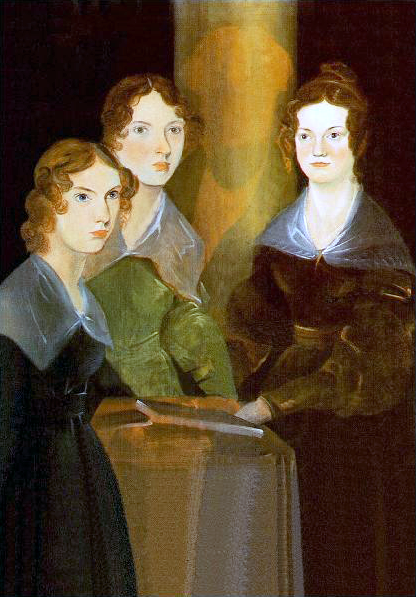Patrick Branwell Brontë Born, 1817
 |
| Self Portrait by Patrick Branwell Bronte |
The six Brontë children were the offspring of the Reverend Patrick and Maria Bronte. They grew up in a small parsonage in a remote village in Yorkshire and were very close to each other, creating a fantasy world together and filling it with characters and stories. The four oldest girls were sent to a charity boarding school for the daughters of poor clergymen. The two oldest came back ill, and died soon after their return. Maria was 11 and Elizabeth 10 when they died of tuberculosis. After that, the remaining girls were schooled at home by their aunt.
Branwell, on the other hand, was carefully educated at home by his father. He studied the classics (Greek and Roman literature), English literature, and European history. His father intended for him to be prepared to enter university.
 |
| Branwell's painting of his sisters: Anne, Emily, and Charlotte |
In 1840, at the age of 23, he found employment as a tutor for a family of young boys, but was dismissed within six months. There was some scandal connected with the dismissal, and it was thought that he may have had a sexual affair with a servant there -- and perhaps even fathered a child.
Shortly after that he found employment with the Luddendenfoot railway station, but was dismissed after a shortage of 11 pounds was found in monies he was responsible for. He was not suspected of theft, however -- just incompetence.
This is not to imply, however, that Branwell was idle during much of his youth. He wrote as copiously as his sisters did. His surviving work comprises about 30 volumes of stories, journals, poetry, literary criticism, translations, and essays. It is estimated that this is only about 10% of his total output, however -- his heirs destroyed much of his writings because they believed them objectionable in terms of moral values or religious outlook.
His sister Anne found him his next job. Anne was employed as a governess at the time, and her employers, Reverend and Mrs. Robinson of Thorp Green, were looking for a tutor for their young son. Branwell took the job -- and soon was corresponding with his friends about the attractions of the young boy's mother. He was dismissed from that job suddenly, too. Apparently Branwell was caught in a compromising position with the somewhat older -- but still alluring -- Mrs. Robinson. (At any rate, he was told that his actions were "bad beyond expression" and he was forbidden to communicate with any member of the Robinson family ever again.)
 |
| Branwell's caricature of himself, summoned by Death |
Sadly, Branwell's drug and alcohol problems were masking another ailment. Branwell was ill with tuberculosis. By the time the family realized he was ill -- he collapsed outside the house -- and summoned a doctor, he was already in the terminal stages. Branwell Brontë died at the age of 31. His sister Charlotte remarked on his death, "I do not weep from a sense of bereavement ... but for the wreck of talent, the ruin of promise, the untimely dreary extinction of what might have been a burning and shining light."
Two of Branwell's remaining three sisters, Emily and Anne, would also die of tuberculosis before a year had passed.
No comments:
Post a Comment